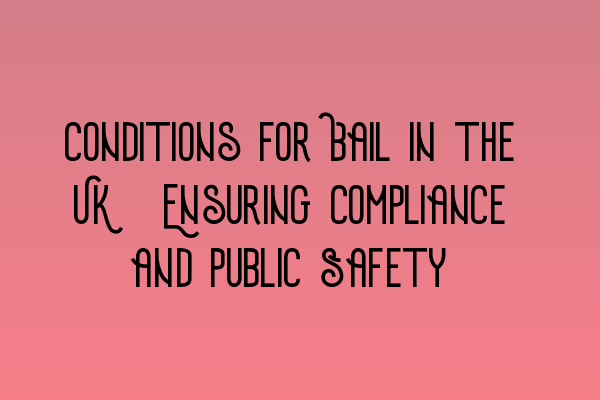Conditions for Bail in the UK: Ensuring Compliance and Public Safety
When facing criminal charges, one of the most significant decisions made by the court is whether or not to grant bail. Bail allows an individual to be released from custody while awaiting trial, but it comes with certain conditions that must be followed to ensure compliance with the law and maintain public safety.
Understanding Bail Conditions
Bail conditions are specific rules set by the court to regulate the behavior of the individual released on bail. These conditions are put in place to mitigate the risk of the accused committing further offenses, interfering with witnesses, or failing to appear for their trial. It is crucial for defendants to adhere to their bail conditions to avoid any potential consequences, such as revocation of bail or additional charges.
Some common bail conditions include:
- Regularly attending court hearings
- Reporting to a designated police station
- Restrictions on travel or movement
- Curfews and electronic monitoring
- Avoiding contact with certain individuals or locations
- Refraining from engaging in certain activities, such as drug use or alcohol consumption
The Importance of Compliance
Compliance with bail conditions is not only a legal requirement but also plays a crucial role in maintaining public safety. By adhering to the conditions set by the court, defendants demonstrate their willingness to respect the legal process and ensure the protection of others.
Non-compliance with bail conditions can have severe consequences, including:
- Revocation of bail and return to custody
- Being charged with additional criminal offenses
- Damage to reputation and credibility in court
- Increased difficulty in obtaining bail in the future
Therefore, it is vital for defendants to fully understand their bail conditions and seek legal advice if they have any concerns or difficulties in complying with them.
Ensuring Public Safety
One of the primary objectives of bail conditions is to ensure public safety. By imposing restrictions on the accused’s behavior, the court aims to mitigate any potential harm or risk they may pose to themselves or others.
It is the responsibility of all parties involved, including the defendant, their legal representatives, and the authorities, to ensure that bail conditions are strictly followed. Regular monitoring and supervision may be necessary for high-risk individuals to prevent any breach of the conditions and address any concerns that may arise.
Public safety is of paramount importance, and bail conditions provide a framework to balance the rights of the accused with the protection of society.
Conclusion
Understanding and complying with bail conditions is crucial for individuals released on bail in the UK. By following these conditions, defendants can demonstrate their respect for the legal process and ensure public safety. It is essential to seek legal advice if there are any difficulties in complying with bail conditions or concerns about their implications.
For further resources related to legal exams and preparation, kindly refer to the following articles:
- SQE 1 Practice Exam Questions
- SQE 1 Practice Mocks FLK1 FLK2
- SQE 2 Preparation Courses
- SQE 1 Preparation Courses
- SRA SQE Exam Dates
